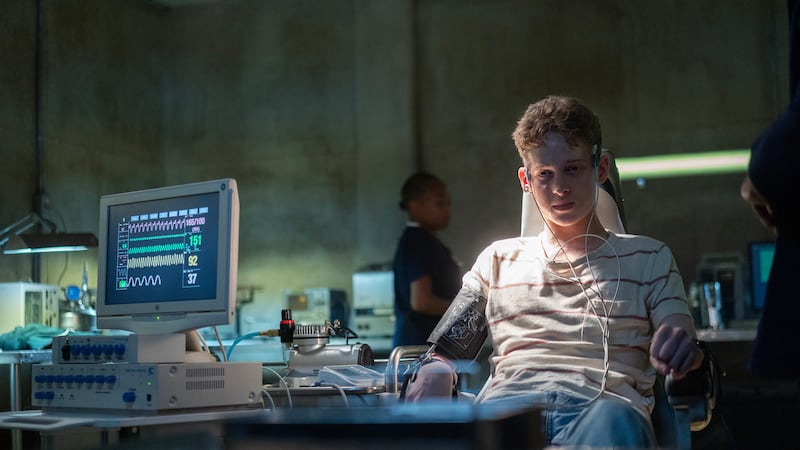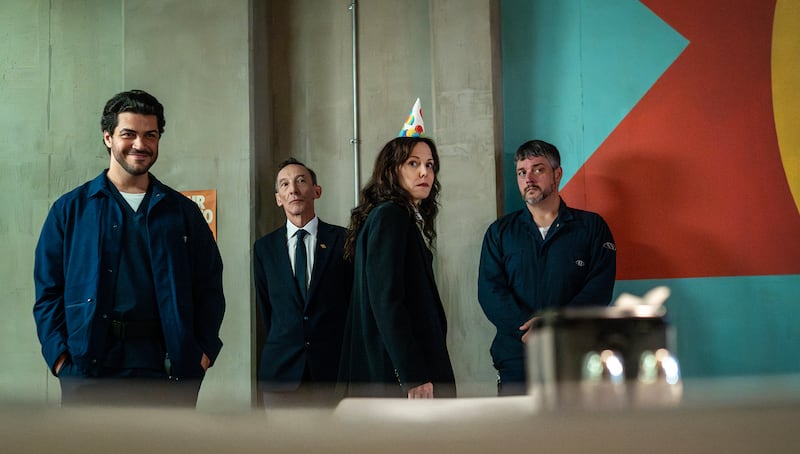Another day, another Stephen King adaptation—this time, of the prolific author’s 2019 thriller The Institute.
The story of a group of children who are kidnapped by a mysterious organization for seemingly malevolent purposes, King’s novel is a hybrid of his own Firestarter and One Flew Over the Cuckoo’s Nest. From its unique terminology to its cold, menacing atmosphere, Benjamin Cavell’s MGM+ series (July 13) is as faithful as they come.
Yet like its source, it’s a saga that’s short on real sparks, treading such well-worn supernatural territory that even the best efforts of stars Ben Barnes and Mary Louise Parker aren’t enough to make it more than a passable entry in the ever-burgeoning King-to-screen catalogue.
From the outside, 14-year-old Jake Ellis (Joe Freeman) looks like the rest of his Timberwolves-loving Minneapolis peers. In reality, however, he’s a child prodigy who’s on the cusp of receiving an opportunity to attend MIT that will force his parents to uproot their lives and relocate to New England. That’s not to be, since one evening Jake is snatched from his bed, and when he awakens, he’s in a facsimile of his room that exists in a cold gray building.
Emerging into a hallway that’s covered in strange elementary school-style posters, Jake meets Kalisha (Simone Miller), who explains that he’s now a resident of The Institute, whose pre-adult residents are all either TK (telekinetic) or TP (telepathic). Given that objects have a funny habit of moving around Jake when he’s upset, this isn’t altogether stunning news to the kid, and he’s soon welcomed into a group that includes trusting George (Arien So), nervous Iris (Birva Pandya), and rebellious Nicky (Fionn Laird).
As Jake learns, the Institute is run by cunning head honcho Ms. Sigsby (Parker), her ruthless chief of security Stackhouse (Julian Richings), and rational Dr. Hendricks (Robert Joy), who with the assistance of sadistic orderly Tony (Jason Diaz) conducts tests on the kids that are designed to instigate and enhance their extraordinary powers—and, in the best case scenario, reveal them to be PCs (precogs) who can see the future.

All of this takes place in the Institute’s Front Half, after which the captive children graduate to the facility’s Back Half and then, supposedly, gain their freedom. Nicky doesn’t buy that story, and neither does Luke. From the outset, he’s skeptical about everything sold by Ms. Sigsby, whom Parker embodies with a superficial positivity that reeks of deception, not to mention derangement—the latter of which is underscored by an early scene in which, upon returning home from work, she soothes herself by burning her leg with a red-hot wire hanger.
Strange, sinister things are afoot at the Institute, and Cavell’s series doles out hints about the organization’s true motives at an enticing pace. Those revelations are at once horrible and complex, as well as thematically related to the recent ordeal plaguing former cop Tim Jamieson (Barnes).
Arriving in small-town Maine with few belongings and no overt purpose, Tim successfully gets a job as the police department’s “night knocker,” whose job it is to nocturnally patrol the enclave’s streets. This is Tim’s way of feeling useful after a traumatic incident in which he shot and killed a kid who was threatening to shoot up a mall. During the course of his duties, he meets officer Wendy (Hannah Galway), to whom he slowly grows closer, and local homeless crank Annie (Mary Walsh), whose intriguing conspiracy theories involve the Institute and psychic phenomena.

Tim and Jake’s paths are destined to cross, but The Institute is most captivating when focusing on the latter’s plight, which involves bizarre experiments known as “Shots for Dots” that make subjects disturbingly sick and weak. The Institute’s combination of pragmatism and cruelty cloaks the proceedings in ominousness, as do Parker and Richings as bureaucratic cogs in a machine that’s ultimately cast in quasi-Holocaust terms.
Instead of just a one-note boogeyman nightmare, the show complicates matters by giving its villains a potentially altruistic reason for their monstrousness. While the moral questions raised by their conduct (and motivations) are ultimately discarded in a way that suggests no one involved really cared about them, they nonetheless add a tantalizing layer to the otherwise straightforward material.
What holds The Institute back from generating more suspense is its performances, especially from its greener cast members. Freeman is competent, if lacking the charisma required to elicit real engagement with his suffering. The same goes for Viggo Hanvelt as Avery, the newest and youngest Institute victim, whose abilities are so great that they afford Luke and company a chance to break out of the Institute.

Their functional turns are a burden the series can’t totally overcome, and the visually unimaginative direction by Jack Bender, Brad Turner, and Jeff Renfroe doesn’t do them any favor—and, at times, seems to actively work against them. As with the Lumineers’ morose credit-sequence cover of Tears for Fears’ “Shout,” the flat action is gloomy to a fault.
Like the best-selling novel upon which it’s based, The Institute feels a tad too much like reheated leftovers. Stackhouse and Tony are psychos that we’ve seen before, Tim is the sort of good-hearted hero that King has favored since Salem’s Lot, and the plot weaves together its strands in a fashion that will be intensely familiar to the writer’s constant readers.
This isn’t to knock those conventions (which remain sturdy and entertaining) so much as to wish that the narrative at hand were more animated and surprising. Even its climactic tragedies feel of a piece with King’s prior output—and, in this instance, don’t hit as hard as they should as a result of the proceedings’ ho-hum Institute protagonists.
Despite its weaknesses, The Institute captures the eerie, constricting mood of the Institute as well as King’s issue with the idea that the ends justify the means—even if, perhaps, those means really are in service of the greater good. It’s also, by design, an efficiently structured and thankfully self-contained affair, all the way to a finale that leaves little wiggle room for any (unnecessary) follow-up. It may be a middle-of-the-road tale from the Master of Horror, but that’s still better than most.









